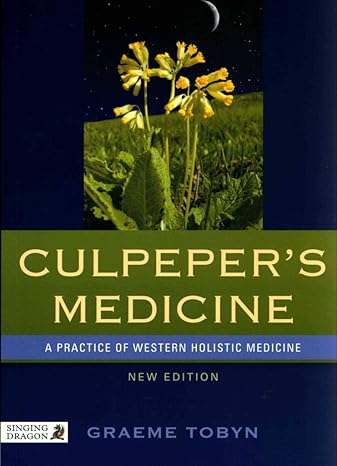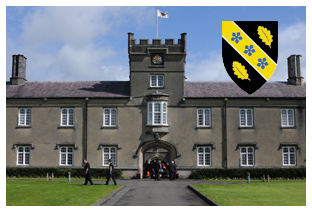Short Course
Nicholas Culpeper’s Astrological Medicine
With Dr Graeme Tobyn
Senior Lecturer at the School of Health, Social Work and Sport at the University of Central Lancashire
An online short course from the Sophia Centre and the Sophia Centre Press
In partnership with the University of Wales Trinity Saint David
And the distance-learning MA degree in Cultural Astronomy and Astrology
The Sophia Centre short courses are part of the Sophia Centre’s academic and scholarly outreach programme. The short courses are open to everyone. Scroll down for enrolment details.
The recommended course text is Grame Tobyn’s Culpeper’s medicine: A practice of Western holistic medicine (London: Singing Dragon, 2013).
What is this course about?

This course is designed to give a comprehensive introduction to key themes in the astrological medicine of Nicholas Culpeper (1616-1654), the great English astrologer, radical and herbalist. Culpeper is renowned today for popularising an understanding of medicine that supported his readers to manage their own healthcare. His most famous work, a version of which is still in print, is his herbal The English Physitian, published in 1652. This small book occupies a vital role in the history of astrological medicine for two reasons:
First, it provided the best description of the time of native herbs, what they were used for and how they were processed into medicinal forms.
Second, it taught how to gather any plant at an astrologically propitious hour for maximal effect when its ruling planet signified the cure or relief of a person in their sickbed.
This course provides an entry into an understanding the theories and techniques of medical astrology at a turning point in history, when astrology was at its most popular, and the groundwork was being laid for modern medicine.
We will look at the theory and practice of Culpeper’s astrology, illustrated with actual examples from the time, and how Culpeper himself was influenced by his great forebears: the Greek author Hippocrates (460-377 BCE), the Roman writer Galen (129-216 CE) and Paracelsus (1493-1541), one of the founders of experimental medicine.
Scroll down for weekly topics
Delivery
The course is taught live online using Zoom and each seminar will be recorded in order to enable you to follow the seminars if you cannot attend live. Each seminar will have time for Q & A's. You will be able to access the full course – recordings and handouts - for personal revision until the end of May 2024.
Moodle
All students will be able to log into the course page on Moodle where all the recordings of the lectures will be uploaded after each session. Also in this area are extensive support material plus a weekly discussion forum for additional questions or general comments.
Certificate of Attendance
All students will receive a Certificate of Attendance from the Sophia Centre Press and the University of Wales Trinity Saint David.
Dates
The seminars will be held on Wednesdays at 16:00 – 18:00 UK time. There will be five seminars on 21 Feb., 28 Feb., 6 March, 13 March and 20 March 2024.
Teaching staff

Dr Graeme Tobyn PhD FHEA
I am a senior lecturer in the School of Health, Social Work and Sports at the University of Central Lancashire with a PhD in history from Lancaster University. Having practised as a herbalist for 26 years, I focus now on teaching and researching. Nicholas Culpeper’s astrological herbal practice has been a focus for many years: I published Culpeper’s Medicine in 1997 and The Western Herbal Tradition with UCLan herbal colleagues in 2011, while more recently writing a book chapter and an article on aspects of Culpeper’s astrology.
Weekly topics: What you will learn on this course
The course will be based around five key themes in Culpeper’s work. The reading listed below indicates the kind of material Graeme will be using. All reading will be online and optional. We recommend you purchase Graeme’s book but otherwise just come and enjoy the lectures!
Week 1: The Astrologo-Physicall Discourse and the celestial vocabulary of healing
In this first class we begin by looking at the foundations of Culpeper’s medicine in the sources he drew on for his occult correspondences between planet, zodiac sign and parts of the body, along with and the arguments he used to justify them. Not only this anatomy but also how the body operated – its physiology – was derived from a coherent explanation in physical and symbolic terms.
Reading:
Graeme. Tobyn (2013) Culpeper’s medicine: A practice of Western holistic medicine. London: Singing Dragon. ISBN 9781848191211
Nicholas Culpeper, An Astrologo-Physical Discourse (transcribed Deborah Houlding)
www.skyscript.co.uk.
Week 2: Lunar symbolism and typologies of temperance and intemperance
Most people in Culpeper’s day did not have the skills to draw up or read a horoscope but they were familiar with lunar symbolism from both gazing at the sky and reading almanacs. In this class we will look at the use of the Moon and its relation to the four temperaments of the Greco-Arabic medical tradition.
Reading:
Graeme Tobyn, Did the Astrological Content of Culpeper’s English Physitian Undermine its Usefulness?, Culture and Cosmos, Vol. 26, no. 2, Autumn/Winter 2022, pp.35–53.*
Temperament descriptions in Nicholas Culpeper, (1655) Astrological judgement of diseases. London: N. Brook
Louise Curth, The Medical Content of English Almanacs 1640-1700, Journal of the History of Medicine and Allied Sciences, 60 (2005), 255-282.*
Dorian Gieseler Greenbaum, From Lilly to Steiner and Jung: Temperament in Astrology and Psychology, in Anna Akasoy, Charles Burnett and Ronit Yoeli-Tlalim (2008) Astro-Medicine: Astrology and Medicine, East and West. Firenze: Sismel, pp.237-258.*
Week 3: Horoscopes, diagnosis and prognosis
The key to Culpeper’s herbal was the horoscope which was printed at the back of his book, through which he attempted to show the power of astrological symbolism in diagnosing disease. Using example horoscopes of the period, the aim of this session is to show how horary astrology, in which a horoscope is cast for the moment that a question is asked, can indicate the origins of personal illness and the best outcome of a period of sickness, if the right course is followed.
Reading:
William Lilly, A mother for her daughter Merlinus Anglicus (1651)*
Curry, Patrick (1989) Prophecy and Power. Cambridge: Polity Press. Chapter 2*
Geoffrey Cornelius, The Moment of Astrology: Origins in Divination 2nd edn. (Bournemouth: Wessex Astrologer Ltd., 2003). Chapter 7 Katarche: the line of descent from augury, pp.124-143.*
Week 4: Prescriptions for Galenic and Paracelsian cures
Culpeper published all his works in a very short period of time, exactly when the dissemination of information in English on Paracelsus’s method of healing became widespread. In this session we explore Culpeper’s prescribing of medicines and how this was influenced by Paracelsus and the theories of the Roman writer Galen. There were larger issues at stake in terms of Culpeper’s desire to see a just system of healthcare in England.
Reading:
Graeme Tobyn, Dr. Reason and Dr. Experience: Culpeper’s assignation of planetary rulers in The English Physitian, in From Masha'allah to Kepler: Theory and Practice in Medieval and Renaissance Astrology, ed. by Charles Burnett and Dorian Greenbaum (Lampeter, Wales: Sophia Centre Press, 2015), pp.473-90.*
Maurizio Meloni (2019) Impressionable biologies: From the archaeology of plasticity to the sociology of epigenetics. Abingdon: Routledge. Chapter 2*
Noga Arikha, Passions and Tempers: A History of the Humours (New York: HarperCollins, 2007).
Week 5: The decumbiture method

This week draws on the substantial part of Culpeper’s major astrological work, Semeiotica Uranica, Or an astrological judgment of diseases, which was devoted to preparing decumbiture charts, which were typically cast for the time when the patent fell ill, and were thought to predict the future course of the disease and the outcome of healing crises according to the treatment of acute diseases in the medicine of Hippocrates aand -Galen. We will explore the method of decumbitures. its usefulness and consider alternatives.
Reading:
Nicholas Culpeper (1651) Semeiotica Uranica; Or, an astrologicall judgment of diseases, London: Peter Cole. Book 1, Of critical days
Michael MacDonald, The career of Astrological Medicine in England, in Religion Medici: Medicine and Religion in Seventeenth-Century England, ed. by Ole Peter Grell and Andrew Cunningham (Aldershot: Scholar Press, 1996), pp.62-90.*
Delivery
The course is taught live online using Zoom and recorded in order to enable you to follow the seminars if you cannot attend live. Each seminar will have time for Q & A's. You will be able to access the full course – recordings and handouts - for personal revision until the end of May 2024.
Moodle
All students will be able to log into the course page on Moodle where all the recordings of the lectures will be uploaded after each session. Also in this area are extensive support material plus a weekly discussion forum for additional questions or general comments.
Dates
The seminars will be held on Wednesdays at 16:00 – 18:00 UK time. There will be five seminars on 21 Feb., 28 Feb., 6 March, 13 March and 20 March.
Course Book

The recommended course book is Graeme Tobyn’s Culpeper’s medicine: A practice of Western holistic medicine(London: Singing Dragon, 2013). You can purchase from your favourite bookshop or from Amazon (below)
Buy UK www.amazon.co.uk
Buy USA www.amazon.com
Registration
The cost which covers all five lectures is £150. Students and graduates of the University of Wales Trinity Saint David can enrol at the University rate of £120.
By registering I agree to follow the Sophia Project netiquette guide.
To register and pay, please click the blue button Make Payment.
The acknowledgement of payment from PayPal will be sent to the email address that you have registered with PayPal. The day before the course starts, the link to join the seminar will also be sent to this address. If you wish the link to be sent to a different email address, please contact sophiacentre@sophia-project.net
Student & Alumni
Students and alumni of the University of Wales Trinity Saint David get a discount for this short course. The rate is £120. Please register and pay by clicking the button below.
You should register by Paypal if possible but, if you can't, email Dr Nick Campion at n.campion@uwtsd.ac.uk and you can arrange to pay by cheque or bank transfer.
Terms and Conditions
Fees and Refunds – Fees must be paid in full before the commencement of the course. Refunds will be made if studnts withdraw from the course before it commences. There are no refunds after students log into the Course Moodle page, which is opened up two days before the course begins.
Forum conduct - All students are expected to follow the netiquette guide and be respectful of other students and the tutor in their forum posts. The course tutor will remove any postings they consider to be inappropriate. The course tutor also reserves the right to block a student from posting on the forums if the student disregards a request by the tutor to revise their forum conduct.
Zoom conduct – Students attending the Zoom lectures live are expected to be focused on these lectures and only use the chat box for question directed at the lecture material. Students who misuse the chat box will be removed from the lecture.
Technology – It is the student's responsibility to ensure that they have sufficient broadband and sufficient skills in operating their computer or tablet to enable them to engage with this online course.
Sophia Centre Short Courses are taught as part of our outreach programme from the University of Wales Trinity Saint David. If you would like to take your studies further, you may apply for our unique, on-line, fully accredited Master's programme in Cultural Astronomy and Astrology, the only academic programme in the world to look explore our relationship with the sky, and the history, philosophy and culture of astrology.
Welcome to the public outreach page of the Sophia Centre for the Study of Cosmology in Culture at the University of Wales Trinity Saint David, with information about studying with the University, as well as links to related conferences, classes, publications and events. To go straight to the Sophia Centre's University page please go here.
Please follow our guidelines on Netiquette.
Click the link below to join our mailing list to keep informed of Sophia Centre events:
Mailchimp
Upcoming Events
2026
27-29 Apr,
Sophia Centre
conference Istanbul 2026

























